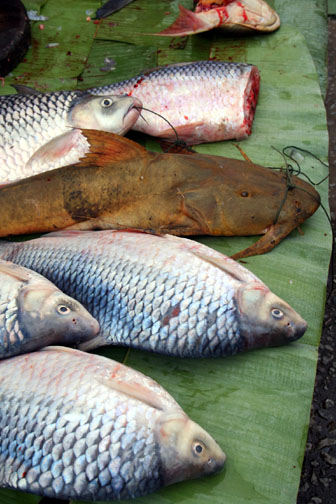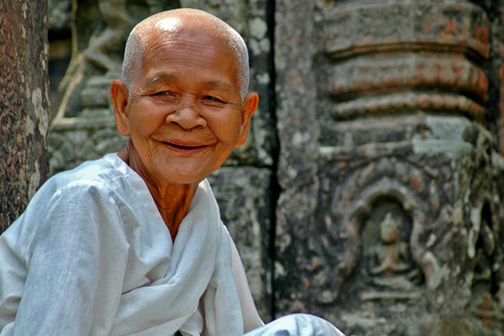There are differences in culture, customs, and language, but at their most basic level, civilizations share one undeniable truth: orgasms sounds the same the world over. Unfortunately, you can’t share an orgasm with everyone you meet. Sometimes the best you can do is to share a smile. Not quite as gratifying, but equally effective in bridging the culture gap in any country, anywhere in the world.
At least when it is an honest one. That’d be the smile. Not the orgasm. I think you can probably fake an orgasm more realistically than you can a smile. At the same time, I think those who fake orgasms are probably the same group of people who have to fake a smile. And that, in turn, I believe is due to their inability to empathize with people who are different from them. Be that in culture, race, religion, age, or perspective. I think that’s what makes the difference between tourists and travellers. Tourists observe. And often find fault. Tourists begin and end their trip as an outsider. Travellers participate, they become engaged in the culture of the places they visit. Or at least make an attempt to. And that often starts with something as simple as a smile.
It’s natural for any of us to fall back on what’s familiar to us to explain the unfamiliar. It’s often a matter of perspective more than of a closed mind, but the result can be just as erroneous. On a trip to Thailand I was trying to convince my friend Helena to try some food from a street cart. She wasn’t too sure if that was a good idea and decided to take a minute to watch the vendor in action first. It was all good until she saw the vendor wash a few plates in a big pot of brown water. “Uh, I don’t think so!” she said, refusing to try what would have been a gastronomical treat.
She saw a pot full of dirty water instead of the big pot of clean soapy water she was more familiar with for that task. Street vendors in Thailand don’t normally have access to running water. But are just as concerned with hygiene. So they use a pot of tea to wash dishes in. Which is actually a great cleansing agent. And probably a lot safer for you than whatever caustic element Thai manufacturers are allowed to put into their dish soap.
I don’t know if that food vendor saw Helena’s face or not, but it was probably a good thing she passed on trying whatever was being cooked. If there was a chance for that vendor to pass off an older portion, something that had fallen on the ground earlier that day, or even just a skimpy serving I’m sure he would have as a warm thanks for the look of disgust on her face. Conversely, a wide smile and expression of delight almost guarantees you’ll get a plate full of the best the vendor has to offer. It’s just an ingrained response; we tend to want to please those who already are pleased with us. A smile is the one currency that will never lose value.
An old idiom says “smile and the world becomes your oyster.” It amazes me how many tourists walk around making sure everyone knows that their oyster has been sitting out in the sun for a few days. That you’d take the time and incur the expense to travel to a foreign country so you could complain and be unhappy with everything foreign about that locale . . . I’m stumped. But then that’s human nature too, I guess. It’s an easy trap to fall into. Tourists embrace their displeasure, travellers reign in their natural inclinations and instead force themselves to enjoy the experience of something different. Regardless of how different it may be. Sometimes you need to remind yourself why you visited a place. Sometimes you need to remind yourself that experiencing a different way of life, a different culture, and a different belief system is part of what travel is about. In fact, that’s the good part.
Sitting out on our small balcony the first morning in Luang Prabang, I was enjoying the serenity of the early hour and the beauty of the garden fronting the hotel. Until my eyes focused on a large statue of a hand. Mine was the back view and it made me stop for a minute and think. Huh. Why in the world would a hotel erect a giant hand flipping off potential customers wandering by?
Later in the day I took a photograph of the statue before heading out for the day, and then decided to get a front shot, too. Ooops. It really was a matter of perspective in this case. The gesture of the hand was a Buddhist mudra with a slightly different meaning than the one I’d assumed. It was an honest mistake, and a simple one. But it got me thinking about how easy it is to misconstrue things we see, or misjudge the motives of people we meet when travelling. And it got me thinking that the difference between tourists and travellers is often in how they deal with those misconceptions.
Countless Westeners have run across swastikas in Bali and have been perturbed, not realizing that symbol predates Nazi Germany. And doesn’t carry a negative connotation in Indonesia. Throughout Asia, I look at bamboo scaffolding erected high along a building’s facade and shudder at the flimsy system used while the place is under construction or being renovated. It may not seem as substantial as the metal scaffolding used back home, but in reality is probably just as safe. I know Americans in foreign lands who grimace at the unusual food being chowed down by locals – stuff too gross to even get close to – never considering that whatever in the hell that stuff is it’s probably more healthy than what’s offered on the menu at McDonald’s back home. As a tourist, it’s easy to look down your nose when you run across the unfamiliar. As a traveller, the unfamiliar is what engages you. The novelty of a place or people and the ability to understand their culture, at least to some degree, is the prize. Becoming part of that experience is what excites travellers. Being able to empathize with people from a different culture is what makes that possible.
It’s the familiar too that separates the tourist from the traveller. The ‘little people’ in a foreign land: taxi drivers, waitstaff, bell hops, salesclerks, security guards, may look a bit different but all fill jobs we are familiar with back home. It’s easy to discount their value to the travel experience. Tourists treat them as second class citizens of third world countries. The Raj is alive and well among tourists. Travellers acknowledge their existence, sometimes just with a smile, more often with a few minutes of pleasant conversation. That small interaction in itself can be rewarding. At other times it can lead into a deeper relationship and the traveller finds himself with a new friend and an opportunity to spend time with a local involved in some activity that no tourist will ever have the chance of experiencing.
Tourists tend to travel in a pack. Even when they are not Japanese. They tend to prefer packaged tours, be that for a day’s outing or the entire trip. It’s the safe way to travel. And they don’t have to think. They get to observe some foreign site while surrounded by people they are familiar with. If they are lucky, they’ll make life-long friends with Mitch and Sue from Omaha. And if they are polite, they’ll tip their local tour guide who spent the day with them a buck or two. Whatever in the hell his name was.
Travellers often go it alone. Rather than head for a place all the guide books tout, which will be overflowing with tourists, instead they head off for points unknown. Discovering the unexpected is part of the thrill for travellers. Even spots frequented by the tourist hordes, when visited at off hours, offer the traveller the opportunity to experience a personal moment instead of a packaged one. Sometimes, logistics dictate joining in on a package tour, but you’ll notice when all the tourists get off the bus and head right, the travellers get off the bus and head left. And if they are lucky they make life-long friends with someone tucked away in some little corner of the world whose name they can’t even pronounce correctly. That just might be the local tour guide all of the tourists spent the day ignoring.
I tend to read a lot of travel blogs and blogs about foreign countries. I’m always thrilled when someone tells about the unexpected find they discovered on a trip. I love the reports that brim with a traveller’s curiosity and wonder of the world. I give those writers kudos for trying new things, for opening themselves up to new experiences. Regardless if the result was positive or a disaster. And I wonder why those who always play it safe even bother to leave home. Tourist’s tales are always filled with warnings : Don’t drink the water! Watch out for the hot midday sun! Wash your hands! Be careful of what you eat, you don’t want a case of rumbly in the tumbly! It surprises me they ever make it out of their hotel. But then when they do, you know it is with a bus load full of their fellow tourists: their pictures always include a swarm of heads in the foreground. And you know all those heads came from Idaho.
Travel should not just be about expanding borders but expanding your world view too. The best thing you can do when travelling is to surround yourself with the unknown, seek out the places that would normally make you uncomfortable, engage people with whom you seem to share the least. Your experience will be much more rewarding. And you will probably find that people all over the world really are not that different after all. Whether they are in the middle of having an orgasm or not.





Earlier this year, I took the faan and two of our/his buddies on a packaged tour for Thai people to Europe. It was the easiest way for him to get his first Schengen visa & it added four countries to a growing list of places he’s visited, but what a disappointing way to travel! Chinese food included for every lunch & dinner (after a couple of days, we broke away from the group meals since I think Italy and France, for example, have some decent native cuisine). Shopping given higher priority than culture stops. “Never again!” for a bus tour.
Undoubtedly a necessary evil to get your Thai friend visa approvals, but what a horrendous way to try and see a foreign locale!
Loved the ‘I think Italy and France, for example, have some decent native cuisine’ line, Mitch. Thanks!